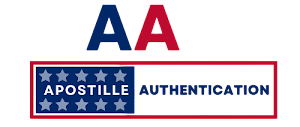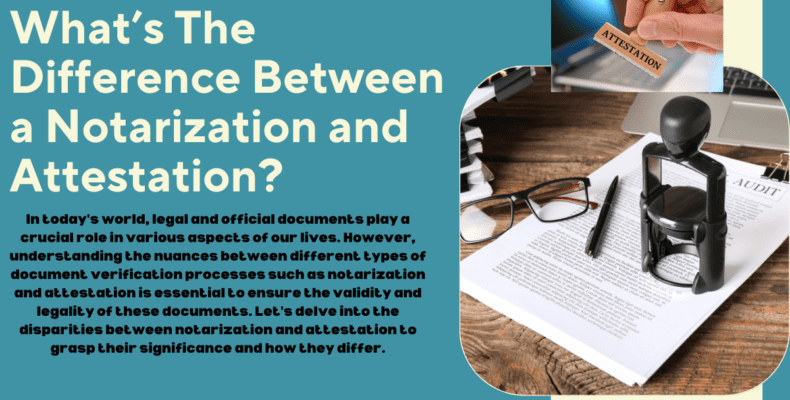In today’s globalized world, where legal documents often transcend borders and jurisdictions, understanding the nuances between notarization and attestation becomes paramount. These two processes, though serving similar functions of validating the authenticity and legality of documents, differ significantly in their scope, procedures, and applicability.
Introduction to Notarization and Attestation
What are notarization and attestation?
Notarization and attestation are legal processes used to validate the authenticity and legality of documents. While both serve similar purposes, they operate under different legal frameworks and have distinct procedures.
Importance of notarization and attestation
Notarization and attestation play crucial roles in various legal and official transactions, providing assurance of the validity and authenticity of documents.
Understanding Notarization
Definition of notarization
Notarization is the process of certifying a document by a notary public, who verifies the identity of the signatory and ensures the document’s authenticity.
Role of a notary public
A notary public acts as an impartial witness to document signings, verifying signatures, administering oaths, and certifying copies of documents.
Types of documents that require notarization
Documents such as contracts, deeds, powers of attorney, and affidavits often require notarization to be legally binding.
Discover the process of notarization and its distinctions from apostille authentication in this comprehensive guide on the differences between notarization and attestation.
Explaining Attestation
Definition of attestation
Attestation involves verifying the authenticity of a document by an authorized entity or individual, usually a government agency or embassy.
Difference between notarization and attestation
While notarization is performed by a notary public and is primarily recognized within a specific jurisdiction, attestation is a broader process that may involve certification by foreign authorities for international use.
Importance of attestation in legal and official documents
Attestation is crucial for documents intended for use abroad, ensuring they are recognized and accepted in foreign jurisdictions.
Process of Notarization
Steps involved in notarization
The process of notarization typically includes verifying the identity of the signatory, ensuring their willingness to sign, and affixing the notary’s seal or stamp.
Examples of documents that need notarization
Legal contracts, property deeds, and affidavits are examples of documents commonly requiring notarization for validity.
Dive deeper into the world of apostilles and authentication as we explore the contrasts between notarization and attestation, offering insights into when each process is necessary and how they differ.
Process of Attestation
Steps involved in attestation
Attestation involves obtaining authentication from relevant authorities, such as government departments or embassies, to confirm the document’s legitimacy.
Instances where attestation is required
Documents like birth certificates, marriage certificates, and educational transcripts often require attestation for international recognition.
Legal Aspects of Notarization and Attestation
Legal implications of notarization
Notarized documents carry legal weight and are admissible as evidence in court proceedings, enhancing their credibility and authenticity.
Legal implications of attestation
Attested documents are recognized as valid and authentic by foreign governments, facilitating their acceptance in international transactions.
Delve into the complexities of notarized translation services while unraveling the distinctions between notarization and attestation, providing clarity on how each process ensures the authenticity and legality of documents in their respective contexts.
Notarization and Attestation in Different Jurisdictions
Variances in notarial practices across countries
Notarial practices vary from one jurisdiction to another, necessitating an understanding of local requirements for document validation.
Importance of understanding jurisdictional requirements
Awareness of jurisdictional differences is essential when dealing with cross-border transactions to ensure compliance with legal standards.
Common Misconceptions and Challenges
Misconceptions about notarization and attestation
Common misconceptions include the belief that notarization guarantees the accuracy of the content in a document and that attestation is a simple formality.
Challenges faced in the notarization and attestation process
Challenges such as language barriers, complex document requirements, and differing legal interpretations can complicate the notarization and attestation process.
Importance of Credibility and Authenticity
Significance of credibility in notarized and attested documents
Credible notarization and attestation enhance the reliability of documents, instilling trust in their content and origin.
Ensuring authenticity through notarization and attestation
The rigorous verification processes involved in notarization and attestation contribute to ensuring the authenticity of documents and mitigating the risk of fraud.
Remote Online Notarization (RON)
Introduction to RON
RON allows documents to be notarized remotely using secure online platforms, providing convenience and accessibility.
Advantages and limitations of RON
While RON offers efficiency and flexibility, concerns about security and compliance with legal requirements remain.
Notarization and Attestation in the UAE and Qatar
Specifics of notarization and attestation in the UAE
In the UAE, notarization and attestation processes adhere to specific guidelines set by government authorities to ensure document authenticity.
Specifics of notarization and attestation in Qatar
Similarly, Qatar has established procedures for notarization and attestation to validate the legality and authenticity of documents used within its jurisdiction.
Fraud Prevention Measures
Measures to prevent fraud in notarized and attested documents
Implementing robust verification protocols and utilizing secure technology can help mitigate the risk of fraud in notarization and attestation processes.
The Role of Notaries Public
Responsibilities of notaries public
Notaries public are entrusted with upholding the integrity of the notarization process and safeguarding the legality of documents.
Qualifications and requirements for becoming a notary public
Becoming a notary public typically requires meeting specific educational and licensing requirements, as well as adhering to ethical standards and legal regulations.
Conclusion
In conclusion, while notarization and attestation serve similar functions of validating document authenticity, they operate under distinct legal frameworks and procedures. Understanding the differences between these processes is essential for ensuring the legality and acceptance of documents in various contexts, particularly in international transactions.
FAQs
1. What is the difference between notarization and attestation?
Notarization involves certifying documents by a notary public within a specific jurisdiction, while attestation verifies documents for international use by relevant authorities.
2. Are notarization and attestation required for all documents?
Not all documents require notarization or attestation. The necessity depends on factors such as the type of document and its intended use.
3. Can documents be notarized or attested remotely?
With advancements in technology, some jurisdictions allow for remote notarization or attestation using secure online platforms, subject to legal and regulatory requirements.
4. How long does the notarization and attestation process typically take?
The duration of the process varies depending on factors such as the type of document, jurisdictional requirements, and administrative procedures, but it generally takes a few days to several weeks.
5. What measures can individuals take to ensure the authenticity of notarized or attested documents?
Individuals should verify the credentials of notaries public or attesting authorities, carefully review the contents of documents before signing, and keep copies of all certified documents for reference.

